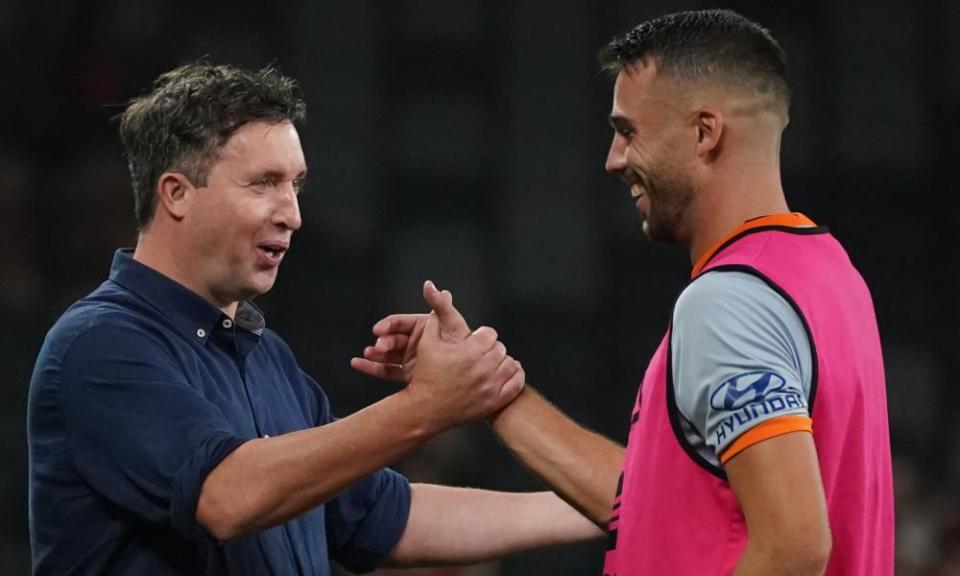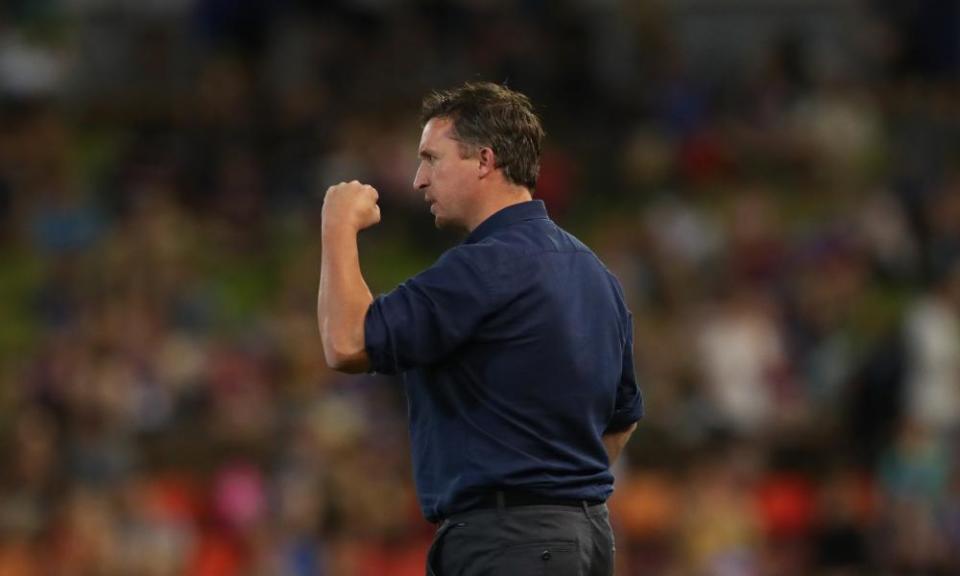Hardworking and humble: Robbie Fowler’s Roar seize on football’s fortunes

In football, games – even seasons – can turn on the tiniest of incidents. A missed chance. A moment’s recklessness. A second’s quick thinking. These are the inflection points that can haunt players or coaches for decades in retirement. Often the significance is apparent in the moment. Steven Gerrard’s slip. A failed offside trap as Ali Daei releases Khodadad Azizi. But more often than not, they’re not.
In round 12 of the A-League, 47 minutes in, a ball strikes Aaron Amadi-Holloway’s arm inside the box. A referee twirling their spoon through the alphabet soup that is IFAB + VAR could easily have spelt “penalty”. This time, they didn’t. In the 80th minute, Angus Thurgate burst through one-on-one on goal, only to spurn the chance as the ball sat stubbornly inside the teenage striker’s gait. In the 90th minute, Jamie Young’s big left hand denied a goal-destined header from Ben Kantarovski. A save of the season.
Related: Sportwatch: Roar's A-League run continues, Stars implode and more – as it happened
Had any one of these three moments resolved differently, on balance of probabilities Ernie Merrick would still be an A-League head coach. But the beauty of football remains that if somebody loses, somebody else wins.
In a 10th v 11th bottom of the table encounter, Newcastle’s 28 December clash with Brisbane was a dramatic inflection point. A rookie coach in his first full season. The decision pre-game to stand down the club’s topline striker and hand an A-League debut to a kid. A third straight loss and a sixth in ten games could have brought all manner of pressure down upon the man they once nicknamed “God”.
From there, Newcastle lost four straight, and a coach along the way. From there, Brisbane won ten points from twelve and now sits knocking at the door of a top-six spot. The sliding doors of football.
Not that Brisbane have been unworthy of such favours of fortune. Four games into the season the Roar had two measly points. It was nowhere near a fair reflection of the performances they had offered. At that stage a very good Wellington side sat empty-handed, and a relatively poor Wanderers sat equal top. These things have a way of evening themselves out.
But while the pressure release can be one simple inflection point, seizing upon an opportunity often requires a wellspring of self-belief.
When Robbie Fowler dropped Roy O’Donovan he benched a player who had scored six of the team’s nine goals. A striker with a proven goal-every-two-games record across five seasons in the A-League. But in handing Mirza Muratovic his first start, he threw an arm around a kid and told him that he believed in him.

With the benefit of hindsight, the Jets game reveals another inflection point. Seven minutes after Thurgate’s miss, Brad Inman scored a spectacular, albeit fortuitous, goal – the equaliser that day, and his first since returning to Australia. Did Fowler get in his ear before the game? Tell the gifted but confidence-shy forward that he could be a match winner? Fast-forward four games and Inman has four goals to his name.
When he arrived in the A-League, the legend of Liverpool, an unlikely marquee to a football club that became a by-word for failure, Fowler showed none of the temperament of a prima donna. The word from Fury teammates was he was down to earth – approachable, despite his fabled reputation.
In his first season as head coach, Fowler has offered an insight into the players he likes to work with. Players like Tom Aldred arrived without big name or big ego, but quickly became admired inside the dressing room. A player’s captain. The quietly-spoken playmaker Jay O’Shea may lead the league for chances created. But he’s also contested more fifty-fifties than anyone else in a Roar shirt.
Even the January window pick-ups, players like Scott McDonald or Corey Brown escaping club environments that weren’t conducive to helping them flourish, have traits in common with Fowler’s foreigners: hard-working and humble.
Related: David Squires on … the comings, and ultimately goings, of Markus Babbel
A maligned figure in Melbourne, Brown enjoyed just one minute as a winner in Victory blue this season – as a time-wasting sub against Perth. In just eight days he’s enjoyed two victories in Brisbane orange – the most recent courtesy his deflected winner. Has Fowler buoyed his spirits? If you asked him he might even eschew his customary “yeah, nah” and just go with “yeah”.
In a team without ego, the most invisible of players has also become an unlikely talisman. Making his reappearance in the side in that fateful Round 12 game was Jacob Pepper. An unobtrusive midfield screener, he covers the turf, he breaks down attacks, and he lays it off to somebody more likely to offer attacking impetus. In fifteen games this season, Brisbane’s record reads 5-4-5. In his seven appearances Pepper’s reads 4-2-1.
He might not be the player targeted by opposition analysts, but he’s exactly the type of player who appears to be thriving under Robbie Fowler. And it’s this collective ethos, and growing camaraderie that’s allowed the Roar to seize upon one of football’s many inflection points and get their season going.

 Yahoo News
Yahoo News 